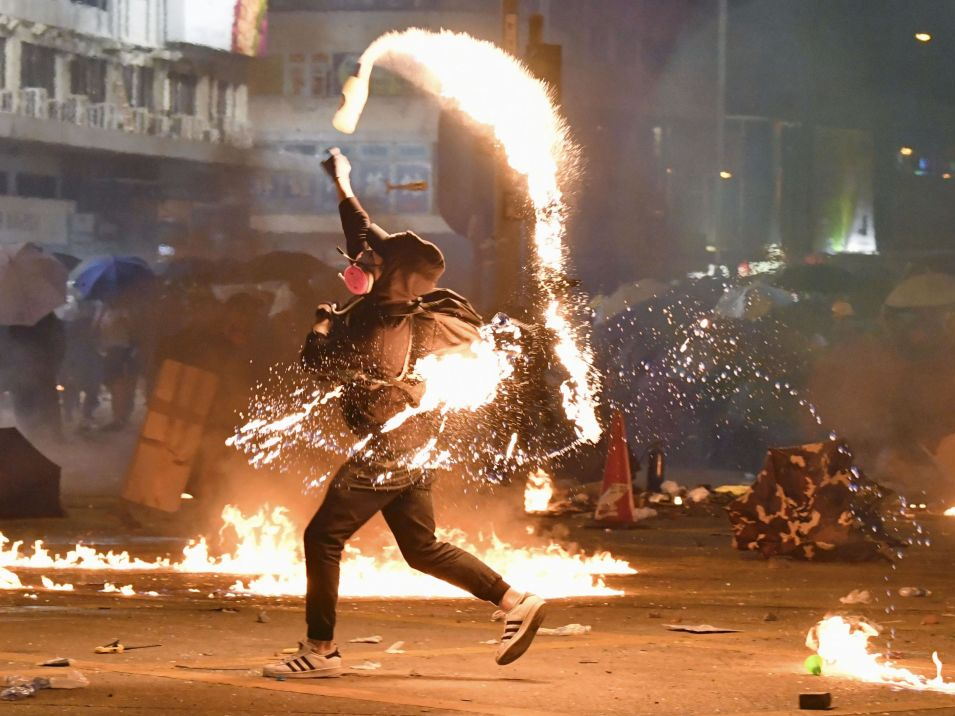- Chinese Americans who use the Chinese app WeChat say they are being censored for writing messages in support of Hong Kong.
- WeChat is ubiquitous in China, so for Chinese Americans with family there it is a major blow to be kicked off the app.
- This is the latest in a pattern of Chinese censorship extending into the US.
- Visit Business Insider’s homepage for more stories.
Chinese American users of the messaging app WeChat are finding their messages containing political criticism of China – particularly those aimed at the protests in Hong Kong – are being censored, The Verge reports.
In one instance an American information security analyst named Bin Xie had his account taken down after writing “The pro-China candidates totally lost,” referring to Hong Kong’s recent election in which pro-democracy candidates gained huge ground against pro-China candidates.
“If you have censorship in China, fine,” he told The Verge. “But in this country? I’m a Republican, but on WeChat I suffer the same as Democrats – we are all censored.”
Xie then joined a WhatsApp group full of Chinese Americans who had similarly been kicked off WeChat for expressing political views.
For Chinese Americans with family in China, being kicked off WeChat is a major problem. The WeChat app is more or less ubiquitous in China, where it covers a broad range of uses. It acts as a messaging app, a dominant payment platform, a social network, and a platform for accomplishing everyday tasks like paying utility bills and booking doctor's appointments. WeChat and its rival Alipay's payment systems have become so everyday that even street vendors and buskers use QR codes rather than accept cash.
Losing access to the app is a major hindrance to anyone wishing to contact Chinese relatives - as popular Western messaging apps like Facebook and WhatsApp are blocked in China - and for anyone who wants to visit the country.
The Verge notes that while generally WeChat applies different censorship rules to Chinese nationals and foreigners, Chinese Americans may fall through the net if they once possessed a Chinese phone number.
In a statement to Business Insider, WeChat's parent company Tencent noted that WeChat is a separate app to Weixin, which operates inside China. Tencent said WeChat and Weixin are are interoperable, describing them as "sister apps." People signing up with Chinese phone numbers would be using Weixin, while people with international numbers would use WeChat.
"Tencent operates in a complex regulatory environment, both in China and elsewhere. Like any global company, a core tenant is that we comply with local laws and regulations in the markets where we operate," a spokeswoman said.
"Weixin and WeChat use different servers, with data stored in different locations. WeChat's servers are outside of China and not subject to Chinese law, while Weixin's servers are in China and subject to Chinese law," she noted.
She added that the interoperablity between WeChat and Weixin messages could lead to "misunderstandings."
"For example, if a WeChat user sends a message to a friend using Weixin, China law applies to the Weixin user and certain content may be blocked. The same content shared between two WeChat users however, would not be blocked," she said.
The extension of Chinese censorship laws beyond its borders has become more pertinent to American citizens in recent months through three high-profile news stories.
- The NBA ended up in a feud with China when the Houston Rockets' general manager, Daryl Morey, tweeted his support for the Hong Kong protests, prompting intense backlash in China, with various sponsors severing ties with the Rockets. Morey deleted the tweet and the NBA called it "regrettable," which sparked fury from US lawmakers.
- Apple banned an app from its App Store that allowed people in Hong Kong to track police activity. Though Apple said the decision was not influenced by China and was instead made because the app was being used to "target and ambush police," US lawmakers piled into the tech giant as siding with Beijing.
- The video game publisher Blizzard came under fire for punishing a professional "Hearthstone" player after he voiced support for the Hong Kong protests during a livestream.

